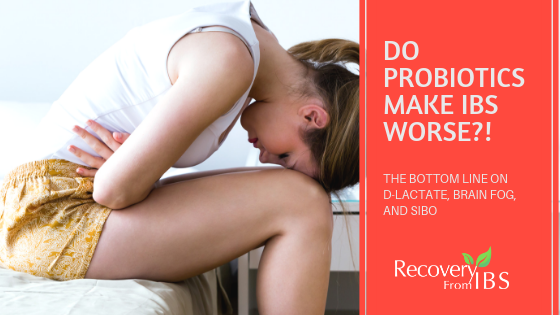
Hi there, do you have concerns about taking a probiotic for IBS (maybe you’ve heard it can produce D-lactate and cause brain fog, especially if you have SIBO)?
Or, have you tried a probiotic for IBS and felt WORSE on it?
If so, don’t miss this!
In this article, I’m going to address some concerns around taking a probiotic for IBS or SIBO and something called D-lactic acidosis.
Here’s the background story: there was a paper published this year that found an association between Irritable Bowel Syndrome (IBS), SIBO, brain fog, and probiotic use (1). They suggested that the probiotics could potentially be increasing D-lactate production and causing brain fog. The paper was immediately countered in the scientific literature, in defense of probiotics (2). This has created some fear and confusion around probiotic use, so I’d like to clarify what the evidence shows.
What is D-lactic acidosis?
First of all, D-lactic acidosis is an uncommon and dangerous condition that develops, most often, with short bowel syndrome (part of the GI tract has been surgically removed). In these cases, certain bacteria in the gut produce an excess of D-lactic acid, and not enough is degraded by other bacteria. This increases the overall acid load in the body and creates symptoms like brain fog and neurological complications. Normally, D-lactic acid is not a problem because there are bacteria in the bowel that DEGRADE it.
When is it a problem?
However, in the case of short bowel syndrome or of small-intestinal bacterial overgrowth (SIBO), that bacterial balance is altered and there can be an increase of D-lactate and/or a reduction of D-lactate degradation (overall, more D-lactate). It’s really critical to know here that SIBO (an overgrowth of bacteria in the small intestine) is believed to be a cause of around 70% of IBS cases. Thus, people with IBS and/or SIBO could potentially be experiencing elevated
D-lactate levels. I’ve definitely seen that some IBS and SIBO patients do experience brain fog that comes and goes, especially after meals. This is a big sign that D-lactate could be an issue.
So, is the problem caused by the probiotic or…..?
Here’s the critical thing to understand here: there’s no evidence that taking a product for IBS is the primary cause of this brain fog. In the paper, there was merely an association between brain fog and probiotic use. However, IBS is the common thread! The patients could have been taking probiotics BECAUSE of their IBS symptoms, and the SIBO (common underlying cause of IBS) could be causing the brain fog.
Also, in another twist, SIBO is known to produce ethanol (alcohol) which can obviously cause symptoms like brain fog.
So, the paper didn’t separate out probiotics versus existing gut bacteria as the cause of the brain fog. Thus, there’s no proof that probiotics cause increased D-lactate. In my clinical experience, I’ve seen cases where I suspected that it was happening. I’ve also seen probiotics cause problems due to other reasons like histamine and immune response. Then, I’ve seen cases where probiotics helped immensely.
Right, so take a probiotic for IBS or not?
Scientific studies have shown that probiotics can benefit IBS patients around 20% of the time. In my experience, it’s a mixed bag, and picking the right product is key to success.
Bottom line, it’s important to be cautious. There are some bacteria strains that do increase D-lactate production and others that don’t. Overall, the Bifidobacterium genus does not produce D-lactate. However, many from the Lactobacillus genus do. These include: L. acidophilus, L. gasseri, L. delbrueckii subsp. bulgaricus, L. fermentum, L. lactis, L. brevis, L. helveticus, L. plantarum and L. reuteri. (3). These bacteria are very common in probiotics and in fermented foods such as yogurt.
Thus, for someone with IBS, I recommend approaching probiotics carefully as follows:
- Take a little bit (i.e. 1/8th dose) at first, then slowly work up. If symptoms such as gas, bloating, pain, or brain fog increase, do not increase the dose. If the symptoms remain after several days on the probiotic, try a different formula.
- Ideally, use a product that is low in D-lactate producing bacteria. There are a number of good quality products on the market that work well for my IBS patients. Two examples are HERE and HERE .
- If still no luck, consider a soil-based probiotic.
- MOST IMPORTANTLY: Address the underlying cause of your IBS! To start, sign up for my free email series about the underlying causes of IBS and how to address them. It starts with a free download including ‘4 Quick Wins to improve IBS within hours’, then follows with a series of helpful emails about how to eliminate IBS at the root. Get the series HERE to begin your recovery journey.
Conclusion
D-lactate could be a concern depending on WHY you have IBS, what bacteria are present in your GI tract, and what probiotic you take. If you experience brain fog/confusion, especially around meals or probiotic doses, either eliminate your probioitc or use one that limits D-lactate production. Most importantly, eliminate your IBS at the root, starting with my FREE meal plan and info series:
Bonus!
Don't miss my FREE one-week meal plan! It's low-FODMAP, nutrient-dense, easy, and delicious!
It's your ticket to try Low-FODMAP (done right) without having to figure it all out first.
It reduces GERD by starving the gas-producing bacteria in your GI tract!
To your health,

Erin Skinner, MS, RD, IFNCP, CPT


